
Blog: Gaza Update: Holding Onto Humanity
![]() Cameron Don
Cameron Don
![]() 15th May 2025
15th May 2025
Our Medical Director, Dr Mhoira Leng, shares an update on the situation in Gaza. Sharing testimony from Cairdeas partners and graduates in Gaza on the bombing of hospitals, forced displacement and starvation, Dr Mhoira and our partners call upon all of us to keep telling of Gaza, and give practical advice on how to respond in solidarity.
What is closest to my heart at this time is Gaza and the people of Palestine as they face almost unbearable catastrophe and suffering. Just over a year ago, I was in Rafah and was an eye-witness to the unfolding genocide that has continued and deepened to levels which are hard to fathom. Genocide is a stark word, however this conclusion is not my own, but that of many experts in international law, human rights organisations and even many holocaust scholars.
Telling and hearing the truth of what is happening on the ground is extremely difficult with a total block on international journalists, a lack of transparency in many of the international news outlets and a fog of propaganda. Doctors have become conduits, directly verifying eyewitness information from trusted colleagues in Gaza. Life expectancy has dropped by 35 years as the numbers with horrific injuries rise daily. The total blockage of food, humanitarian aid and medical supplies which leads to no treatment for basic medical problems such as epilepsy, or high blood pressure and even less for cancer. Now we are seeing the horrific scenes of forced starvation stalk this tiny strip of land and the weakest being the most vulnerable; the young, the elderly, the sick.
Listen to Randa, a nurse and one of our Diploma graduates as she speaks of the bombing on the European Gaza Hospital.
'As a nurse at the European Gaza Hospital, I am trying to reach out and let the world know that the hospital is now out of service. Since yesterday, we have been relentlessly bombarded with missiles and shelling that has not ceased. This forced all patients, the injured, children, and every department in the hospital to flee — along with the medical staff. We left carrying only our bags and our tears, helpless and devastated. There is nothing we can do — the occupation spares no one: not the sick, not the staff, not the wounded, and not even children. We evacuated, but there are still patients in the ICU, along with nurses and doctors who chose to stay behind to care for those on ventilators. They could not be evacuated due to the lack of available ICU beds and life-support equipment in other hospitals. We have stared death in the face more than once, unsure each time whether we would survive the next strike or not.
Bearing witness to what is happening has taken me to many different places, countries and people; from churches, solidarity vigils, interfaith groups, to a wonderful conference in Malaysia with the Asia Pacific Hospice Network. I am part of the executive of PallCHASE (www.pallchase.org) and also the Scottish Palestine Health Partnership (www.scotpalhp.org and see the next conference flyer) through which we seek to build networks, and hope and plan for the day when we can start to rebuild but also commit to telling of Gaza and each and every day. (see the wonderful poem by Khawla Badwan, featured to the right)
Advocating for better access to care for people living with chronic disease has been a major part of our work. Imagine having no access to medications to control your heart problems or kidney disease or cancer? We worked hard with the WHO to try to ensure pain control was available for those injured in bombs and fires, for those with cancer, for those needing surgery. Sadly all our efforts have come up against the almost complete blockade of food and medical supplies and has led to NO oral morphine. I continue to work with colleagues all over the world not only for Gaza but also to ensure this has a much higher priority in any emergencies such as Ukraine, Myanmar and Sudan through a network for palliative care in humanitarian settings.
Let me share some reflections from our Gaza colleagues, ways you can be informed and also ways to be involved.
Our dear friends have moved from asking for our help to speaking of their exhaustion and endurance yet also a deep sense of abandonment from the international world.
"They say “a difficult night”?! As if during the day, flowers are showered upon us…As if the nights before were calm?! All our moments are harsh…All our moments are painful…From the break of day to the end of night…All our time is stained with blood, filled with body parts and corpses…There is no calmness here. We are dying every second. ��" Suha Sulima Shaatt
"My dear Mhoira asked me for some moving words about the situation in Gaza... I couldn't find anything in the dictionaries of Arabic, English, or any other language in the world that could describe what happened and is happening in Gaza. These are summarized to reflect the values of the modern world, proud of the values of justice, humanity, and dignity. We recently realized in Gaza that these words and terms are only valid for use by the powerful in this world. So let us be silent and not disturb any of the evils of the civilized Western world.’" Suha Sulima Shaatt
I speak with Dr Khamsi Elessi, our Cairdeas partner in Gaza, regularly. He has now been forcibly displaced along with his extended family 16 times, just imagine the upheaval! He spoke just after the terrible bombing of Ahli Christian Hospital to encourage healthcare colleagues in solidarity.
"After 17 months of this barbaric carnage against our people in Gaza strip, which has left more than 60000 deaths and more than 120000 injuries, still there is a major disaster that is always overlooked by the mainstream media which is the forced eviction of people from their houses, tents or shelters. Being evicted suddenly with your family under fire again and again feels like a relentless cycle of fear, despair, and exhaustion. Every time I think I’ve found some safety, it’s ripped away after a short while, leaving many Palestinians displaced, vulnerable, and struggling to hold onto hope. This constant fatal uncertainty wears us all down, making survival feel like an endless battle with no safe refuge in sight.
To doctors and healthcare workers in Scotland who stand in solidarity and want to help Palestinians in Gaza strip, I say, your compassion and support mean more than words can express. In times of crisis, knowing that people across the world care and take action brings strength to us in Palestinian hospitals and to the hundreds of thousands facing unprecedented carnage, eviction, and hardship. Your willingness to send doctors to treat patients and injured...your determination to stand with those in need, whether through advocacy, donations, or simply raising awareness about the injustice being committed against our innocent people in Gaza, makes a real difference. Once again, thank you for your kindness, your humanity, and for reminding us that even in the darkest times, solidarity shines through."
How do we respond in solidarity?
Firstly, there is so much confusion that I suggest humble listening and being informed and even being willing to have views challenged and changed. Here are some suggestions:
- Rev Munther Isaac’s new and brilliant book ‘Christ in the Rubble’ is just out and highly recommended.
- Peter Beinart’s clear and short book ‘Being Jewish after the Destruction of Gaza’.
- Watch one of the excellent films which show the reality in West Bank such as ‘Where Olive Trees Weep’, ‘No Other Land’ or the recent Louis Theroux documentary ‘The Settlers’.
- Watch Daniel Munayer, from Musalaha video on hope. https://youtu.be/BTpKubN8j1I
- Link with others and join the movement of solidarity which includes vigils, interfaith events, professional conferences, charitable giving and engaging with elected representatives.
- We are supporting colleagues in Gaza and Sudan through Cairdeas IPCT so please consider giving generously if you are able.
- Look after one another and let us not turn away even when it is hard.
I believe God shows us the way of justice, reconciliation and peace and we trust in him for yesterday, today and tomorrow. I love this statement by Daniel Munayer whose family have been involved in reconciliation ministries in Palestine for many years.
‘People have turned hope into a means of evading responsibility and becoming passive. Hope is not optimism. Hope should not be a topic that makes us passive. Hope draws us from passive comfort into costly solidarity.’ Daniel Munayer, Musalaha.
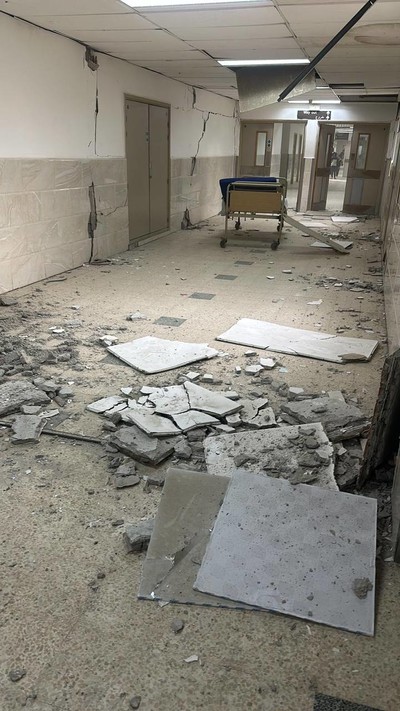
Scenes of violence and destruction in hospital corridors
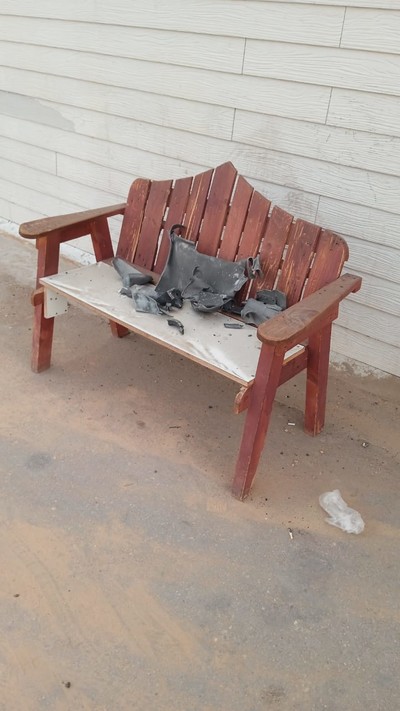
A hospital bench, where patients and staff sat, now littered with shrapnel
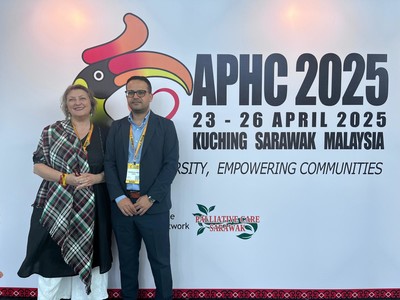
Meeting with Hamouda Abu Oudah, from Gaza but now in Hong Kong, at the APHC conference in Malaysia
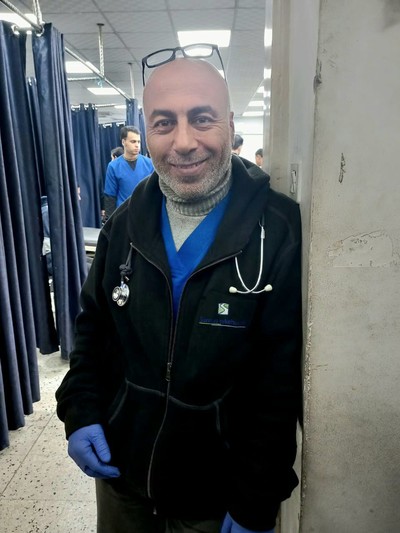
Khamis Elessi, Cairdeas partner in Gaza, on his recent birthday
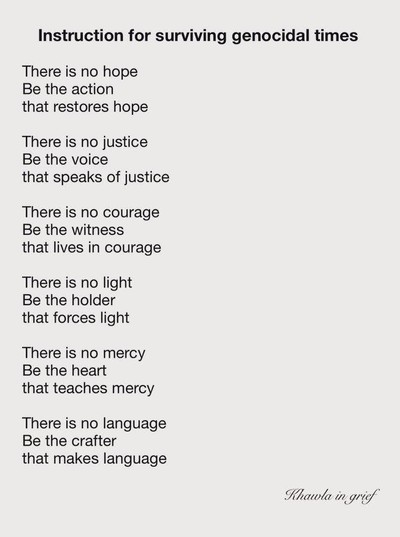
'Instruction for surviving genocidal times' by Khawla Badwan
